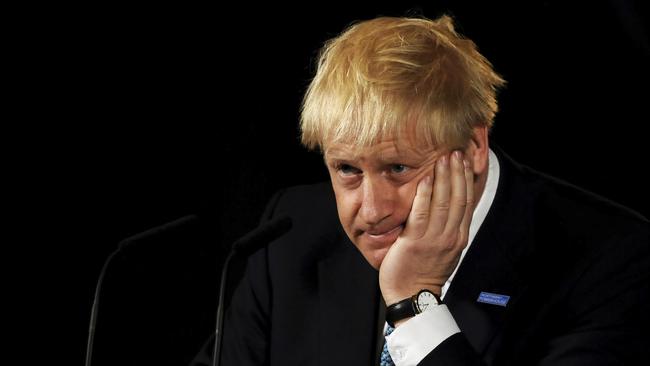Johnson delivers bounce for Tories
The new British Prime Minister has earned a “Boris bounce” for the Conservatives as Nigel Farage’s Brexit Party has seen its vote squeezed.

The new British Prime Minister has earned a “Boris bounce” for the Conservatives as Nigel Farage’s Brexit Party has seen its vote squeezed.
The Tories have opened up a 10-percentage-point lead over Labour, a surge that will fuel speculation about a general election this year.
The poll commissioned by The Sunday Times shows the Conservatives jumping six points since Boris Johnson became Prime Minister on Wednesday to 31 per cent, the biggest lead over the opposition in five months and the first time support has risen above 30 per cent since April. YouGov’s survey puts Labour in second place on 21 per cent.
Mr Johnson has set up a “war cabinet” to deliver Brexit “by any means necessary” by October 31 as a senior cabinet minister said there was “now a very real prospect” of no deal. Michael Gove, the minister responsible for no-deal preparations, said the government was “working on the assumption” that Brussels would not strike a fresh agreement.
In a Whitehall revolution, Mr Johnson will make every decision on Brexit policy with a team of just six senior ministers — all of them Brexiteers who support no deal.
Starting tonight, the war cabinet — Mr Gove, Chancellor Sajid Javid, Foreign Secretary Dominic Raab, Brexit secretary Steve Barclay and Attorney-General Geoffrey Cox — will plot Britain’s course.
Putting the country on a war footing, Mr Johnson has ordered Mr Gove to chair meetings of civil servants and political advisers every day — including Sundays — until the 2016 referendum result is delivered.
Dominic Cummings, Mr Johnson’s most senior aide, summoned advisers to No 10 on Friday night and declared that the Prime Minister had tasked him with delivering Brexit “by any means necessary”. The term — used by the US black rights activist Malcolm X — puts the EU and Remainer MPs on notice that Mr Johnson is prepared to suspend parliament or hold a general election to thwart those seeking to block no deal. While Mr Johnson’s team wants to avoid an election before the end of October, Leave supporters hoping to be Tory MPs are having their applications to join the party’s candidate list fast-tracked to ensure more Brexit backers are elected if a snap poll is forced on the government by a vote of no confidence.
Mr Cummings also made clear that ministers were preparing for a no-deal emergency budget in the week of October 7.
Insiders say the government will go “hell for leather for no deal” in order to see whether the EU “blinks” and ditches the backstop, but the “central planning assumption of government” is that Britain is on course for no deal.
While the election of a new Tory Prime Minister has given the party a boost, Jo Swinson, the newly elected leader of the Liberal Democrats, has seen her party fall below Labour in the polls since she took over on Monday. Her party is now in third place on 20 per cent, down three points since the beginning of the week.
Support for the Brexit Party has been squeezed to 13 per cent, half the party’s peak support after the European elections in May.
The poll also points to the potential for Mr Johnson to squeeze Mr Farage’s support even further, with more Brexit Party voters saying they have a positive opinion of the new Prime Minister than even Tory supporters. Overall, the poll shows that 43 per cent of those surveyed think that Britain will be out of the EU by October 31, compared with 30 per cent who think it will still be a member.
If Britain fails to leave on October 31, 36 per cent of people say it will be Mr Johnson’s fault, compared with 22 per cent who would blame the EU.
Looking at Mr Johnson’s options for leaving the EU, the poll shows that 19 per cent of voters think he will be able to renegotiate a deal, while 66 per cent think he will be prepared to leave without a deal, compared with 12 per cent who think he would not.
Asked about their expectations, the public think a no-deal Brexit is the most likely outcome, with 37 per cent of those surveyed predicting that Britain will crash out of the bloc, compared with 15 per cent of people who think there will be a second referendum.
The Sunday Times



To join the conversation, please log in. Don't have an account? Register
Join the conversation, you are commenting as Logout